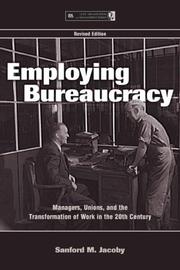| Listing 1 - 8 of 8 |
Sort by
|

ISBN: 0691015708 0691007438 1282738348 9786612738340 1400822394 1400812186 9781400822393 9781400812189 9780691007434 6612738340 9781282738348 9780691015705 Year: 1997 Publisher: Princeton, NJ : Princeton University Press,
Abstract | Keywords | Export | Availability | Bookmark
 Loading...
Loading...Choose an application
- Reference Manager
- EndNote
- RefWorks (Direct export to RefWorks)
In light of recent trends of corporate downsizing and debates over corporate responsibility, Sanford Jacoby offers a timely, comprehensive history of twentieth-century welfare capitalism, that is, the history of nonunion corporations that looked after the economic security of employees. Building on three fascinating case studies of "modern manors" (Eastman Kodak, Sears, and TRW), Jacoby argues that welfare capitalism did not expire during the Depression, as traditionally thought. Rather it adapted to the challenges of the 1930's and became a powerful, though overlooked, factor in the history of the welfare state, the labor movement, and the corporation. "Fringe" benefits, new forms of employee participation, and sophisticated anti-union policies are just some of the outgrowths of welfare capitalism that provided a model for contemporary employers seeking to create productive nonunion workplaces. Although employer paternalism has faltered in recent years, many Americans still look to corporations, rather than to unions or government, to meet their needs. Jacoby explains why there remains widespread support for the notion that corporations should be the keystone of economic security in American society and offers a perspective on recent business trends. Based on extensive research, Modern Manors greatly advances the study of corporate and union power in the twentieth century.
History of North America --- Economic sociology --- anno 1900-1999 --- United States --- BE / Belgium - België - Belgique --- US / United States of America - USA - Verenigde Staten - Etats Unis --- 658.310 --- 331.220 --- 331.228 --- 331.19 --- 658.300 --- 658.313 --- Betrekkingen van de arbeiders met de werkgevers: algemeenheden. --- Geschiedenis van de maatschappelijke klassen en bewegingen: algemeenheden. --- Geschiedenis van de vakbonden. --- Geschiedkundige en andere inlichtingen over industriële, financiële en handelsondernemingen. --- Industriële psychologie en ergonomie. Arbeidsverrijking. --- Vertegenwoordiging en medebeheer van het personeel. Arbitrage en bemiddeling in industriële conflicten. --- Welfare state. --- Capitalism --- Economic conditions --- State, Welfare --- Economic policy --- Public welfare --- Social policy --- State, The --- Welfare economics --- Welfare state --- Geschiedkundige en andere inlichtingen over industriële, financiële en handelsondernemingen --- Geschiedenis van de maatschappelijke klassen en bewegingen: algemeenheden --- Geschiedenis van de vakbonden --- Industriële psychologie en ergonomie. Arbeidsverrijking --- Betrekkingen van de arbeiders met de werkgevers: algemeenheden --- Vertegenwoordiging en medebeheer van het personeel. Arbitrage en bemiddeling in industriële conflicten --- United States of America

ISBN: 9780805844108 0805844104 0805844090 1410610144 9781410610140 9780805844092 9781135705435 9781135705473 9781135705480 Year: 2004 Publisher: Mahwah, N.J. : Lawrence Erlbaum,
Abstract | Keywords | Export | Availability | Bookmark
 Loading...
Loading...Choose an application
- Reference Manager
- EndNote
- RefWorks (Direct export to RefWorks)
Deftly blending social and business history with economic analysis, Employing Bureaucracy shows how the American workplace shifted from a market-oriented system to a bureaucratic one over the course of the 20th century. Jacoby explains how an unstable, haphazard employment relationship evolved into one that was more enduring, equitable, and career-oriented. This revised edition presents a new analysis of recent efforts to re-establish a market orientation in the workplace. This book is a definitive history of the human resource management profession in the United States, showing
#SBIB:316.334.2A24 --- #SBIB:93H3 --- Technologische verandering: algemene ontwikkelingen (mechanisering, automatisering) --- Thematische geschiedenis --- Personnel management --- Working class --- Bureaucracy --- Labor unions --- History --- Corporations --- Employment management --- Human resource management --- Human resources management --- Manpower utilization --- Personnel administration --- Interorganizational relations --- Political science --- Public administration --- Organizational sociology --- Management --- Employees --- Employment practices liability insurance --- Supervision of employees
Book
ISBN: 9780691217215 9780691217208 0691217211 0691217203 0691217629 Year: 2021 Publisher: Princeton Princeton University Press
Abstract | Keywords | Export | Availability | Bookmark
 Loading...
Loading...Choose an application
- Reference Manager
- EndNote
- RefWorks (Direct export to RefWorks)
No detailed description available for "Labor in the Age of Finance".
E-books --- Employers and workers organisations --- Social law. Labour law --- United States --- United States of America --- Labor movement --- Labor unions --- Corporate governance --- Financialization --- History
Multi
ISBN: 9780125894500 0125894503 Year: 1964 Volume: 12 Publisher: Amsterdam Elsevier Science
Abstract | Keywords | Export | Availability | Bookmark
 Loading...
Loading...Choose an application
- Reference Manager
- EndNote
- RefWorks (Direct export to RefWorks)
Automatic control --- Chemical engineering --- Programming (Mathematics) --- Commande automatique --- Génie chimique --- Programmation (Mathématiques) --- EPUB-LIV-FT ELSEVIER-B
Book
ISBN: 9780691186917 Year: 2018 Publisher: Princeton, NJ
Abstract | Keywords | Export | Availability | Bookmark
 Loading...
Loading...Choose an application
- Reference Manager
- EndNote
- RefWorks (Direct export to RefWorks)
Multi
ISBN: 9780691186917 Year: 2018 Publisher: Princeton, N.J. Princeton University Press
Abstract | Keywords | Export | Availability | Bookmark
 Loading...
Loading...Choose an application
- Reference Manager
- EndNote
- RefWorks (Direct export to RefWorks)
Book
ISBN: 0898625149 0898620783 9780898625141 9780898620788 Year: 1988 Publisher: New York: Guilford press,
Abstract | Keywords | Export | Availability | Bookmark
 Loading...
Loading...Choose an application
- Reference Manager
- EndNote
- RefWorks (Direct export to RefWorks)
Family --- Feminism --- Child care --- Divorce --- Family policy --- Families --- Family - United States. --- Feminism - United States. --- Child care - United States. --- Divorce - United States. --- Family policy - United States.
Book

ISBN: 9783110867787 Year: 2019 Publisher: Berlin Boston
Abstract | Keywords | Export | Availability | Bookmark
 Loading...
Loading...Choose an application
- Reference Manager
- EndNote
- RefWorks (Direct export to RefWorks)
| Listing 1 - 8 of 8 |
Sort by
|

 Search
Search Feedback
Feedback About UniCat
About UniCat  Help
Help News
News